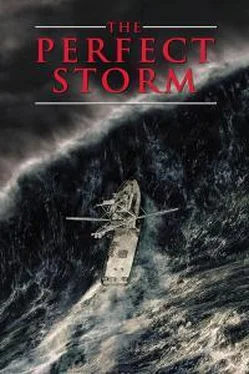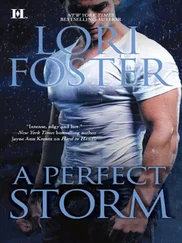Sebastian Junger - The Perfect Storm
Здесь есть возможность читать онлайн «Sebastian Junger - The Perfect Storm» — ознакомительный отрывок электронной книги совершенно бесплатно, а после прочтения отрывка купить полную версию. В некоторых случаях можно слушать аудио, скачать через торрент в формате fb2 и присутствует краткое содержание. Жанр: Триллер, Проза. Описание произведения, (предисловие) а так же отзывы посетителей доступны на портале библиотеки ЛибКат.
- Название:The Perfect Storm
- Автор:
- Жанр:
- Год:неизвестен
- ISBN:нет данных
- Рейтинг книги:3 / 5. Голосов: 1
-
Избранное:Добавить в избранное
- Отзывы:
-
Ваша оценка:
- 60
- 1
- 2
- 3
- 4
- 5
The Perfect Storm: краткое содержание, описание и аннотация
Предлагаем к чтению аннотацию, описание, краткое содержание или предисловие (зависит от того, что написал сам автор книги «The Perfect Storm»). Если вы не нашли необходимую информацию о книге — напишите в комментариях, мы постараемся отыскать её.
The Perfect Storm — читать онлайн ознакомительный отрывок
Ниже представлен текст книги, разбитый по страницам. Система сохранения места последней прочитанной страницы, позволяет с удобством читать онлайн бесплатно книгу «The Perfect Storm», без необходимости каждый раз заново искать на чём Вы остановились. Поставьте закладку, и сможете в любой момент перейти на страницу, на которой закончили чтение.
Интервал:
Закладка:
Jigging for mackerel worked well, but it was inevitable that the Yankee mind would come up with something more efficient. In 1855 the purse seine was invented, a 1,300-foot net of tarred twine with lead weights at the bottom and cork floats at the top. It was stowed in a dory that was towed behind the schooner, and when the fish were sighted, the dory quickly encircled them and cinched the net up tight. It was hauled aboard and the fish were split, gutted, beheaded, and thrown into barrels with salt. Sometimes the school escaped before the net was tightened and the crew drew up what was called a "water haul”; other times the net was so full that they could hardly winch it aboard.
Purse seining passed for a glamorous occupation at the time, and it wasn't long before codfishermen came up with their own version of it. It was called tub trawling and if it was more efficient at killing fish, it was also more efficient at killing men. No longer did groundfishermen work from the relative safety of a schooner; now they were setting out from the mother ship in sixteen-foot wooden dories. Each dory carried half a dozen 300-foot trawl lines that were coiled in tubs and hung with baited hooks. The crews rowed out in the morning, paid out their trawls, and then hauled them back every few hours. There were 1,800 hooks to a dory, ten dories to a schooner, and several hundred ships in the fleet. Groundfish had several million chances a day to die.
Pulling a third of a mile's worth of trawl off the ocean floor was backbreaking work, though, and unspeakably dangerous in bad weather. In November of 1880, two fishermen named Lee and Devine rowed out from the schooner Deep Water in their dory. November was a hell of a time to be on the Grand Banks in any kind of vessel, and in a dory it was sheer insanity. They took a wave broadside while hauling their trawl and both men were thrown into the water. Devine managed to clamber back into the boat, but Lee, weighed down by boots and winter clothing, started to sink. He was several fathoms under when his hand touched the trawl line that led back up to the surface. He started to pull.
Almost immediately his right hand sunk into a hook. He jerked it away, leaving part of his finger on the barbed steel like a piece of herringbait, and kept pulling upwards towards the light. He finally broke the surface and heaved himself back into the dory. It was almost awash and Devine, who was bailing like mad, could do nothing to help him. Lee passed out from the pain and when he came to, he grabbed a bucket and started bailing as well. They had to empty the boat before they were hit by another freak wave. Twenty minutes later they were out of danger and Devine asked Lee if he needed to go back to the schooner. Lee shook his head and said that they should finish hauling the trawls. For the next hour he pulled gear out of the water with his mangled hand. That was dory fishing in its heyday.
There are worse deaths than the one Lee almost suffered, though. Warm Gulf Stream water meets the Labrador Current over the Grand Banks, and the result is a wall of fog that can sweep in with no warning at all. Dory crews hauling their gear have been caught by the fog and simply never seen again. In 1883, a fisherman named Howard Blackburn—still a hero in town, Gloucester's answer to Paul Bunyan—was separated from his ship and endured three days at sea during a January gale. His dorymate died of exposure, and Blackburn had to freeze his own hands around the oar handles to continue rowing for Newfoundland. In the end he lost all his fingers to frostbite. He made land on a deserted part of the coast and staggered around for several days before finally being rescued.
Every year brought a story of survival nearly as horrific as Blackburn's. A year earlier, two men had been picked up by a South American trader after eight days adrift. They wound up in Pernambuco, Brazil, and it took them two months to get back to Gloucester. From time to time dory crews were even blown across the Atlantic, drifting helplessly with the trade winds and surviving on raw fish and dew. These men had no way to notify their families when they finally made shore; they simply shipped home and came walking back up Rogers Street several months later like men returning from the dead.
For the families back home, dory fishing gave rise to a new kind of hell. No longer was there just the grief of losing men at sea; now there was the agony of not knowing, as well. Missing dory crews could turn up at any time, and so there was never a point at which the families knew for sure they could grieve and get on with their lives. "We saw a father go morning and evening to the hilltop which overlooked the ocean," recorded the Provincetown Advocate after a terrible gale in 1841. "And there seating himself, would watch for hours, scanning the distant horizon ... for some speck on which to build a hope."
And they prayed. They walked up Prospect Street to the top of a steep rise called Portagee Hill and stood beneath the twin bell towers of Our Lady of Good Voyage church. The bell towers are one of the highest points in Gloucester and can be seen for miles by incoming ships. Between the towers is a sculpture of the Virgin Mary, who gazes down with love and concern at a bundle in her arms. This is the Virgin who has been charged with the safety of the local fishermen. The bundle in her arms is not the infant Jesus; it's a Gloucester schooner.
AFTER Mary Anne leaves the Green Tavern, Chris and Bobby finish up their drinks and then tell Bugsy that they're going out for a while. They step out of the barroom darkness into the soft grey light of Gloucester in the rain and walk across the street to Bill's. Bobby orders a couple of Budweisers while Chris fishes a dime out of her pocket and calls her friend Thea from a pay phone. She and Thea used to be neighbors in a housing project, and Chris thinks she might be able to borrow Thea's apartment for a while to give Bobby a proper goodbye. She wants to be alone with him for a while, and she wants to help Bugsy out if she can. It's possible Thea might be interested in him—he's leaving in a few hours for the Grand Banks, but you never know.
Thea says come by any time, and Chris hangs up and goes back to the bar. Bobby's hangover has alchemized into a huge empty hunger, and they finish off their beers and leave a buck on the bartop and head back outside. They drive across town to a lunch place called Sammy J's and order two more beers and fishcakes and beans. Fishcakes are Bobbys favorite food and he probably won't see them again until he's back on shore. The last thing fishermen want to eat at sea is more fish. They eat fast and pick up Bugsy and then drive over to Ethels. Chris has had a falling out with Ethel's boyfriend, and Chris is going to move out everything she has stored there. It's still raining a little, everything seems dark and oppressive, and they carry boxes of her belongings down one flight of stairs and pack them into the Volvo. They fill the car with lamps and clothes and house plants and then squeeze themselves in and drive across town to the projects on Arthur Street.
Thea doesn't go for Bugsy; as it turns out, she's already got a boyfriend. The four of them sit around talking and drinking beer for a while, and then the men have a terrible realization: They've forgotten the hotdogs. Murph, who is charged with buying food for the trip, won't get hotdogs on his own, so if they want any they'll have to get them on their own. They drive to Cape Ann Market and Bobby and Bugsy run into the store and come back a few minutes later with fifty dollars' worth of hotdogs. It's midafternoon now; it's getting close. Chris drives them back down Rogers Street, past Walgreen's and Americold and Gorton's, and turns down into the gravel lot behind Rose's Marine. Bobby and Bugsy get out with their hotdogs and jump from the pier to the deck of the Andrea Gail.
Читать дальшеИнтервал:
Закладка:
Похожие книги на «The Perfect Storm»
Представляем Вашему вниманию похожие книги на «The Perfect Storm» списком для выбора. Мы отобрали схожую по названию и смыслу литературу в надежде предоставить читателям больше вариантов отыскать новые, интересные, ещё непрочитанные произведения.
Обсуждение, отзывы о книге «The Perfect Storm» и просто собственные мнения читателей. Оставьте ваши комментарии, напишите, что Вы думаете о произведении, его смысле или главных героях. Укажите что конкретно понравилось, а что нет, и почему Вы так считаете.












